1. ALISON – over 60 million lessons and records 1.2 million unique visitors per month
2. COURSERA – Educational website that works with universities to get their courses on the Internet, free for you to use. Learn from over 542 courses.
3. The University of Reddit – The free university of Reddit.
4. UDACITY – Advance your education and career through project-based online classes, mainly focused around computer, data science and mathematics.
5. MIT Open CourseWare – Free access to quite a few MIT courses that are on par with what you’d expect from MIT.
6. Open Culture – Compendium of free learning resources, including courses, textbooks, and videos/films.
7. No Excuse List – Huge list of websites to learn from.
8. Open YALE Courses – Open Yale Courses provides free and open access to a selection of introductory courses taught by distinguished teachers and scholars at Yale University All lectures were recorded in the Yale College classroom and are available in video, audio, and text transcript formats. Registration is not required
9. Khan Academy – Watch thousands of micro-lectures on topics ranging from history and medicine to chemistry and computer science.
10. Zooniverse – Take part in a huge variety of interesting studies of nature, science, and culture.
11. TUFTS Open CourseWare – Tufts OpenCourseWare is part of a new educational movement initiated by MIT that provides free access to course content for everyone online. Tufts’ course offerings demonstrate the University’s strength in the life sciences in addition to its multidisciplinary approach, international perspective and underlying ethic of service to its local, national and international communities.
12. How Stuff Works? – More scientific lessons and explanations than you could sort through in an entire year.
13. Harvard Medical School Open Courseware The mission of the Harvard Medical School Open Courseware Initiative is to exchange knowledge from the Harvard community of scholars to other academic institutions, prospective students, and the general public.
14. VideoLectures.NET – the title says it all – amazing video lectures on many topics.
15. TED – Motivational and educational lectures from noteworthy professionals around the world.
16. Shodor – A non-profit research and education organisation dedicated to the advancement of science and math education, specifically trough the use of modeling and simulation technologies. Included in this site are instructional resources, software, interactive lessons, explorations and information about workshops for students, teachers and learners of all ages on mathematics and science. Make sure you check Shodor Interactive – a great collection of interactive math, geometry, fractal, probability, algebra and statistics activities.
17. Udemy FREE Courses – hundreds of experts teach on Udemy every month including New York Times best-selling authors, CEOs, Ivy League professionals and celebrity instructors. Courses include video, live lectures and tools to help teachers interact with students and track their progress. There are many free courses that can teach you business online, law, programming, design, mathematics, science, photography, yoga and many more.
18. Maths & Science – Courses, tests and learning materials about mathematics and science for students from 1 to 12 grade.
19. edX.org – Free courses designed specifically for interactive study via the web, provided by MIT, Harvard, Barkley, Georgetown, Boston University, University of Washington, Karolinska Institute, Kyoto University and many more.
20. iTunes U – Apple’s free app that gives students mobile access to many courses. It offers many free video courses, books, presentations and audio lectures.
21. Liberty Classroom – Owned by bestselling author Tom Woods. Offers some free courses in history and economics, but at the price of one movie ticket a month you can gain access to a lot of useful information. Not completely free, but totally worth it…
22. Drawspace – Hundreds of free drawing lessons.
23. Codeacademy – Easy way to learn how to code. It’s interactive, fun and you can do it with your friends.
24. Duke U – Duke offers variety of free courses on iTunesU.
25. Scitable – A free science library and personal learning tool that currently concentrates on genetic, the study of evolution, variation and the rich complexity of living organisms.
26. My own business – Offers free online business administration course that would be beneficial to new managers and to anyone who is interested in starting a business.
27. Kutztown University’s free courses – The Kutztown University of Pennsylvania’s Small Business Development Center offers more than 80 free business online learning. Kutztown’s courses are individualized and self-paced. Many of the courses feature high-end graphics, interactive case studies and audio streams.
28. Open Learn – Gives you free access to Open University course materials.
29. Free Computer Books – Free computer, mathematics, technical books and lecture notes.
30. Academic Earth – Free video lectures from the world’s top scholars.31. American Sign Language Browser – Teach yourself sign language online
32. BBC Languages – Teach yourself a new spoken language online.
33. unplugthetv – Randomly selects an educational video for you to watch.
34. Lifehacker – Learn to hack life! Tips and tricks for improving all areas of your life.
35. JustinGuitar – Hundreds of free guitar lessons as well as some basic music theory.
36. DuoLingo – Learn a new language for free while helping to translate the web.
37. Layers Magazine – Photoshop, Illustrator, Dreamweaver, Flash, Premiere Pro, In Design and After Effects tutorials.
38. Creative Flow – list of OVER 950 Photoshop tutorials to keep your skillset up to date.
39. Open2study – Open2Study delivers free, high-quality education online. You can study subjects with real value, and in just four weeks you can learn something new, explore the next step in your career, challenge yourself or simply satisfy your curiosity. These subjects are provided by leading Australian institutions, and are taught by academics and leading industry professionals who love to teach. All you need is an internet connection and the desire to study.
40. OEDb – Choose from over 10,000 free online classes
'People will forgive you for being wrong, but they will never forgive you for being right - especially if events prove you right while proving them wrong.' Thomas Sowell
Search This Blog
Monday, 17 November 2014
Five countries including India, China and Russia account for 61% of all slavery
Modern slavery affects more than 35 million people, report finds
Five countries including India, China and Russia account for 61% of all slavery, says Australia-based Walk Free Foundation
- Larry Elliott, economics editor
- The Guardian,
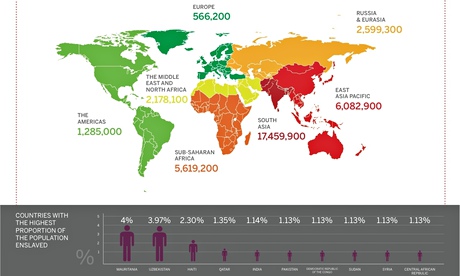
More than 35 million people around the world are trapped in a modern form of slavery, according to a report highlighting the prevalence of forced labour, human trafficking, forced marriages, debt bondage and commerical sexual exploitation.
The Walk Free Foundation (WFF), an Australia-based NGO that publishes the annual global slavery index, said that as a result of better data and improved methodology it had increased its estimate 23% in the past year.
Five countries accounted for 61% of slavery, although it was found in all 167 countries covered by the report, including the UK.
India was top of the list with about 14.29 million enslaved people, followed by China with 3.24 million, Pakistan 2.06 million, Uzbekistan 1.2 million, and Russia 1.05 million.
Mauritania had the highest proportion of its population in modern slavery, at 4%, followed by Uzbekistan with 3.97%, Haiti 2.3%, Qatar 1.36% and India 1.14%.
Andrew Forrest, the chairman and founder of WFF – which is campaigning for the end of slavery within a generation – said: “There is an assumption that slavery is an issue from a bygone era. Or that it only exists in countries ravaged by war and poverty.
“These findings show that modern slavery exists in every country. We are all responsible for the most appalling situations where modern slavery exists and the desperate misery it brings upon our fellow human beings.
“The first step in eradicating slavery is to measure it. And with that critical information, we must all come together – governments, businesses and civil society – to finally bring an end to the most severe form of exploitation.”
Countries identified as leading the fight to end modern slavery include Australia, Austria, Georgia, Ireland, the Netherlands, Norway, Sweden, Switzerland, the UK and the US. Only Australia, Brazil and the US, however, were making efforts to address the issue in government procurement and the supply chains of businesses operating in there.
Modern slavery is a live political issue in the UK, with a bill on the issue moving through parliament and David Cameron highlighting it in his speech to the Conservative party conference this year.
“But there’s still more injustice when it comes to work, and it’s even more shocking. Criminal gangs trafficking people halfway around the world and making them work in the most disgusting conditions,” Cameron said.
“I’ve been to see these houses on terraced streets built for families of four, cramming in 15 people like animals. To those crime lords who think they can get away with it, I say ‘no, not in this country, not with this party’ … With our modern slavery bill we’re coming after you and we’re going to put a stop to it once and for all.”
Olly Buston, WFF’s movement director, said: “There is still a chance that the modern slavery bill will make Britain’s anti-slavery laws the best in the world. But the draft bill must be strengthened. Children and other victims of slavery need to be properly protected. And the bill must ensure that businesses take action to end slavery in their supply chains”.
Sunday, 16 November 2014
The world is run by sociopaths – but we still demand honesty at the till
The worldview of Which? has a moral clarity that is missing from nearly every other sphere of life these days

As supermarket giants puzzle over their profit warnings and the nation readies itself to spend a household average of 800 quid it doesn’t have, here’s a quick rundown of festive scams. I don’t mean drunk people in reindeer horns pretending to have lost their wallet and asking for two pounds; that’s next month.
No, I mean the ways we are ripped off in shops. I quite like an old-fashioned swindle, it gives me a sense of continuity: the person who designed the chocolate finger packet so it contains more air than finger is descended on a direct moral line from the grocer of olden days who used to hide a clog in a bag of flour. It is reassuringly simple: most of gangster capitalism is only barely understood by the people perpetrating it, and makes the victim feel foolish, not only for having been the mark in the first place but also for the sudden spotlight on their ignorance. I personally would like to see someone go to prison every time one of us is required to learn a new acronym: if we’d instituted that after the Libor scandal, would there ever have been a Forex?
Clearly, retailers couldn’t stay competitive if they didn’t keep up with the modern world of the corporate predator. Not every consumer shakedown is a period piece: the great cheese swindle, in which wholesale prices have gone down while supermarkets – apparently by wild coincidence, and certainly not because anybody thinks they’re operating as a cartel – put their prices up, has a lot in common with today’s energy market. What we need is some kind of regulatory body to monitor the undulations of milk protein. We could call it Ofcheese. I will happily take charge of that, when the time comes.
But back to the shops, where a new Which? survey suggests there are three broad categories of swindle: making you buy a thing because you think it’s better quality than it is; because you think it’s better value than it is; or because you think it’s healthier than it is. The tricks are so craven, it’s a little embarrassing to name them. The own brand might be designed to be indistinguishable from the branded version. Goodfella’s pizzas print calorie counts based on a person eating only one quarter of a pizza, which nobody has ever done since pizzas were invented. Biscuits loaded with sugar are called “light” because they have reduced their proportion of fat (what with the scandal of the air-Fingers on one hand, and McVitie’s “lite” digestives on the other, I think we could also make a case for the creation of Ofbiscuit). Fruit juices that are mainly apple are adorned with two strawberries and called “strawberry smoothie”. This has solved two mysteries that have plagued me throughout my child-rearing years: how can anyone afford to produce 300ml of pure strawberry juice? (Because that’s not what it is.) And what is the point of the word “smoothie”? (Unlike “juice”, there is no widely understood definition of the word, separate from the product. So you don’t have to name it after what it’s actually made of; you can name it after something it reminds you of.)
Department stores hunt bigger game, packaging things as “gift sets” in order to stick an unwarranted 20% on their prices. We’ve known that for years. And they engage in affective propaganda, trying to manipulate your gift-giving mindset to include people like cousins. You can snort at this, confident you will never be so sheep-like as to buy a pepper grinder for someone whose name you have been known to get wrong. But consider: do you do Halloween? There is no such thing as the successful refusnik of marketing strategies, only variations of late adopter.
What I really love about Which? surveys – indeed, the existence of Which? as an institution – is the sense of moral clarity. There is very broad-based agreement, across the political spectrum, that people selling things ought to be open and honest about what they’re selling. There is total consensus in the shopping universe that markets are social spaces, and like any other social space will only function if people treat others as they themselves would want to be treated. This certainty has gone missing from conversations elsewhere: a banking scandal always comes garnished with people arguing that the financial sector is so wedged with talent that it should be unleashed from moral codes, the better to dazzle us with its heady ambitions. Business is increasingly presented as a quixotic, ungovernable process, upon which we all rely so heavily, and to which we should render such gratitude, that it is not for us to question it. Inevitably, this comes with the expectation that the successful entrepreneur or innovator will be sociopathic – indeed, that that’s what marks him or her out as so special: the ability to separate themselves from the muddled matters of trust and sympathy that beset the world of the non-entrepreneur. And yet, somehow, we’ve retained this elemental demand for fairness at the till. “Buyer beware” doesn’t cut it: the seller also has a responsibility not to con people. Granted, it’s not a responsibility they take very seriously, least of all at Christmas, but it’s heartening that we’re still bothering to articulate it.
Incidentally, the way to prevent overspending in supermarkets and department stores is to wear headphones piping extremely loud, motivational music; it doesn’t have to be anti-consumerist in content, just bouncy, the kind of thing joggers listen to. It does more than speed up your progress around the shop, it taps into a part of your psyche that doesn’t need unnecessary stuff because it already feels great. Complaining about shops and their moral deficiencies is necessary but insufficient. I would like to see shops treated a bit more like shoplifters – prosecuted for dishonesty even when it seems petty – and shoplifters treated a bit more like shops.
For now I just need an iPod, and my red-blooded resistance will commence.
Saturday, 15 November 2014
Cricketing technique is a myth
David Hinchliffe in Cricinfo

Trying to hit a ball through the covers is totally different from being taught the proper way to cover-drive. One makes robots, the other makes runs © Getty Images
Technique is a myth.
For every technical perfectionist, there are many more who defy the copybook. Even Bradman, with his unusual backlift, was no stranger to the unorthodox. Yet you could argue that he is the greatest sportsman of all time; certainly the greatest batsman in the stats book. Bradman is far from alone. If I were to ask you to name the technical masters you could give me a list of grand heroes: Dravid, Boycott, Gavaskar and so on. Yet if I asked you to name some greats regardless of technique your list would likely be much longer.
You might argue that within this elite group, there are similarities. All great batsmen watch the ball with a still head. All great bowlers have exceptional balance. The variations are fine, but the core is essentially the same. There's a fair chance you were told these by a coach or heard it from a TV commentator with first-class experience. Reliable sources everyone, so why would you think otherwise?
Except, the more we look into technical elements scientifically, the more we see that even the core of skill has variation between individuals. Some people are moving at the point of delivery. Some people are not watching the ball closely. Some bowlers generate pace with horrible actions. These are tested and proven facts.
-----Also Read
-----Also Read
Why are Asians under represented in English cricket?
------
It makes sense when you think about it. Cricket is played by the imperfect mess that is a human being. Each one is genetically unique from height to physical strength to preferred hand and eye (yes, we all have a stronger eye). We all move differently and think differently. From that primal soup of genes, we are thrown into a culture that influences us further. To expect a boy growing up on the streets of Mumbai with a tennis ball to have the same method as a girl from Surrey with hours of formal coaching at a club is ridiculous. And, isn't that the joy of cricket anyway: It can accommodate every type of person from anywhere in the world? Not many sports can offer the same inclusiveness, even at the highest level.
I'm a coach for my day job and I was brought up on "proper technique". You play straight. You bowl side on. You iron out flaws in players who are doing it incorrectly. As the years passed I began to soften to what was correct. I started to realise that there is scope for variety, scope for what works for an individual. Then one day I realised that there was nothing left in the correct column any more. Everything was open to negotiation. Coaching was no longer about correcting technique, and all about helping the player find his or her best technique. Sometimes - most of the time - that means shutting up and letting the players work it out for themselves. That takes a heck of a lot of confidence because on the outside you look like someone who knows nothing and has nothing to say. In fact, you know that a player will understand himself far more that you will ever understand him. It's your job to help accelerate that process. That's why mystery spinners appear most often from cultures where there is little formal coaching. Players have to work it out for themselves and are never told they are doing it wrong. The ones who do that best end up playing Test cricket, often out of nowhere.
There is still a role for the coach at every level. Learning happens faster with someone to guide you. It's just that the modern coach has a different approach. Players are given challenges to complete and asked to work out the answer for themselves. For example, trying to hit a ball through a gap in the covers is totally different from being taught the proper way to cover drive. One makes robots, the other makes runs.
A world with flexible technique is a fun world to watch as well as coach. Bowlers and batsmen who are different are much more watchable. Imagine a team of technical grinding batsmen and right arm medium-fast bowlers. Now throw in someone like a Pietersen, who has a crazy uncoachable technique and approach to batting. Add a Narine with the ball and equally individual method. Now we are having a good time. For this reason I'm glad the idea of technical perfection is dying. Cricket is all the better for variety at every level. So, the next time your team's coach - or your son's coach - is quiet instead of prescriptive, or doesn't just run a net and bark instructions, give him a nod of silent recognition that you understand.
Friday, 14 November 2014
Ittefaq Nama
Najam Sethi in The Friday Times
My foreign trip has been ruined by happenings back home. Imran’s party wallah has gone to court to say agents of gormint are harassing him. “Haw?” judge is asking. “Every time I pick up my landline phone to dial out, a voice says: ‘your phone has been cut off due to non-payment of bill’”, he replied. Did I tell them to do civil disobedience and not pay bills of utilities, hain ji? Naw they are threatening massive dharna on November 30 to paralyze gormint.
I told Shbaz Saab worry not, if we are dethroned, we will set up new business. “Which one?” Shbaz Saab asked. “We’ll make windows, like Bill Gates. Look how much money he’s made. Only puzzle is that his name is Gates but he makes windows, hain ji?” But other people are worst off. I was in German recently. One unfartunate man, hailing from Lahore, was sattled in Frankfurt. His wife was nag and abusive. When his daughter applied for college, she brought farms to Abu to fill out. In section of Mother Tongue, Unfartunate advised his daughter, “Likh puttar, write my child ‘very long, black and be lagaam meaning out of control’”. Haw sad.
Unfartunate prevailed upon me to counsel his wife. When I met her I said, “Bhabi, why you are so mean to your husband?” She told me heart-wrenching story. “Mian Saab, he is so unromantic. Last week he went on trip. I was missing him so sent him a message: ‘If you are sleeping, send me your dreams. If you are laughing, send me your smile. If you are eating, send me a bite. If you are drinking, send me a sip. If you are crying, send me your tears’. Horrible man replied, ‘I am sitting on commode. Now tell?’” Then she bust into tears.
Needlass to say, I was leaving German with heavy heart so Her Majesty Angela Merkel asked me, “Prime Minister, what is the problem?” I sighed, “Your Highness, will I live to see democrat generals and a reasonable Imran Khan?” She replied, “just as I will not live to see unicorns, you will not live to see democratic generals and a reasonable Imran Khan. These are all fictional characters.”
The right has won control of the English-speaking world - thanks to the weakness of the left
Over the last three decades, leftwing parties in the English-speaking world have taken on much of the right’s antidemocratic programme and lost their souls
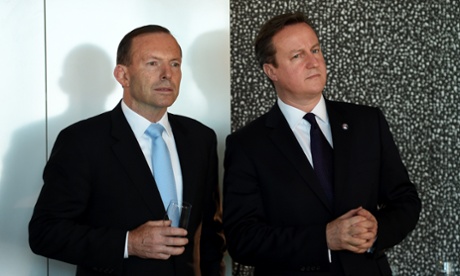
Besides the 5-Eyes spying agreement, the English-speaking democracies of the North Atlantic and the South Pacific are frequently said to have a few things in common. British prime minister David Cameron recited them perfectly before the Australian parliament on Friday: “open economies and open societies”, a free press, and “real democracy and the rule of law” safeguarded by liberal institutions.
These fantasies underpin the canonical history of what the rightwing calls the Anglosphere. Conservative thinktankers get misty-eyed when they hear speeches like these, which downplay the way in which these English traditions were imposed by settler colonists on countries stolen from their indigenous inhabitants. The Australian prime minister, Tony Abbott, did just that in his introduction to Cameron’s visit:
It’s hard to think that back in 1788 [Sydney] was nothing but bush and that the marines and the convicts and sailors ... must have thought they had come almost to the moon.
Right now the Anglosphere nations share another institution: everywhere, the political right is in charge, despite the times offering us reasons to vote for parties emphasising leftwing notions of environmental responsibility, equality, and military restraint.
The Intergovernmental Panel on Climate Change has just reminded us again that the planet is frying beneath our feet. Economic inequality has widened in the Anglosphere over the last 30 years, and even more sharply in the last decade. In the “recovery” from the global financial crisis, in the UK and the US middle class incomes have declined, with the gains going to the very rich. In former welfare states like the UK, austerity policies are literally starving vulnerable citizens. Conservatives in other Anglosphere countries, like Australia’s treasurer Joe Hockey, would dearly like to follow the Tories’ example.
The only exemption to the defunding of public services are military and intelligence agencies — the air forces of Australia, Canada, the US and Britain are busy fighting in a new phase of the endless, profligate, unwinnable war in the Middle East. Over the course of this war, intelligence cooperation between the proud liberal democracies of the Anglosphere has evolved into what Edward Snowden has called a “supra-national intelligence organisation that doesn’t answer to the laws of its own countries”.
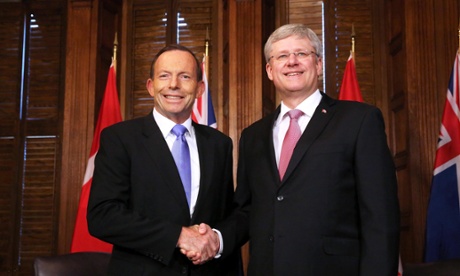
Despite all this, the right are enjoying a new heyday that puts the Thatcher and Reagan years in the shade. Australia is ruled by the most reactionary national government in its history. Stephen Harper, having first transformed Canadian conservatism into a simulacrum of the US Republican party, is now remodelling the country itself as a petro-state. In New Zealand, a scandal implicating prime minister John Key’s staff in the smearing of political rivals did not prevent his National party government being returned in September. In the UK an austerity-mad Tory-led coalition government is drifting further right, as it (and Labour) dance to a tune set by the golf club bigots in Ukip. In the US, Republicans — who have spent the last four years obstructing Obama’s painfully modest agenda — are now making conciliatory and cooperative noises because they are effectively the party of government, and are seeking to clear the way for their own agenda.
Each country has its own internal political dynamics. In each case the right has come to power in different ways. But these groupings share a lot of ideological common ground. This is no accident — multinational corporate lobbying, a global network of thinktanks, and the planetary echo chamber afforded by organisations like Rupert Murdoch’s News Corporation keeps right wing ideas circulating and resonating throughout the English speaking world.
Anglosphere conservatives want to erode whatever remains of their respective welfare states, with a particular emphasis on wrecking social security, education and public health. They have profited by scapegoating immigrants or refugees, and stoking paranoia about border security. More so than in previous eras of rightwing ascendancy, they are joined at the hip to the carbon merchants whose products are worsening the climate disaster already under way. While Abbott waxes lyrical about the civilising properties of coal, Harper redesigns Canada’s foreign policy around getting the products of its dirty oil sands industry to market. In the US, the Koch brothers and other carbon moguls bankroll the Republican party. If New Zealand and UK conservatives are less strident on this topic, it’s because their carbon industries are nonexistent or were deliberately destroyed. Right now, they’re all committed to the negotiation of a Trans -Pacific Partnership that economist Joseph Stiglitz says benefits “the wealthiest sliver of the American and global elite at the expense of everyone else”.
The funny thing is that — with the exception of Key’s relatively moderate government — all of these rightwing majorities are unpopular. Obama’s approval ratings may be catastrophically low, but Congress’s are even lower — the Republican takeover is based on the consistent support of a small, well-mobilised, conservative fraction of the electorate and the refusal of erstwhile Democrat supporters to turn out to vote. Since their failure to win a majority in their own right, the UK Tories — whose MPs are virtually all stationed in the countryside and comfy suburbs of England — have only declined in their standing. In Australia the Liberals’ polling has been in an election-losing position almost since they came to government, and the electorate have resolutely disliked Abbott since before he assumed power. In Canada, Harper has been in negative electoral territory for well over a year.
Their ideas aren’t well-liked, either. In Australia, the Abbott government has sustained most of the damage to its standing following the passage of a budget that the electorate correctly judged to be unfair to the most vulnerable. In the recent mid-terms, despite returning Republican candidates, US electorates passed a raft of progressive initiatives, including several mandating a rise in the local minimum wage, a couple making recreational marijuana legal, and even some mandating maximum class sizes in public schools.
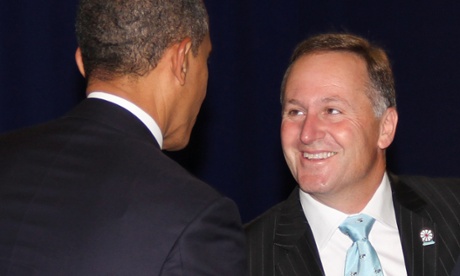
Alaska, for example, returned a Republican senator and congressman at the same time that it legalised marijuana, voted for a minimum wage, and restricted mining to protect salmon refuges; a measure aimed at re-imposing taxes on oil companies only narrowly failed. In the UK, you could be forgiven for thinking from media coverage that immigration is the uppermost priority for voters. In fact, it’s increasing funding to the NHS, which the Tories would like to eviscerate even more thoroughly than they have. In all of these countries, polling shows that the decline of public services, privatisation, and economic insecurity are perennial concerns for large swathes of their respective electorates.
The main reason the right finds itself in this position is not their own strength, or the broad acceptance of their ideas, but the weakness of mainstream leftwing parties. Partly this is down to a lack of effective political leadership. While Republicans ran against the president in the US midterms, so, often enough, did his Democrat colleagues. So desperate were they to avoid any association with him that some were led to refuse to admit that they had ever voted for him. Not only were candidates distancing themselves from what Jeb Lund called Obama’s “one major legislative achievement”, the Affordable Care Act, but they also gave only lukewarm support to the progressive ballot measures (and attendant social movements) that any sensible centre-left party might have viewed as a source of potential renewal. In the UK, Ed Miliband’s personal unpopularity is equalling the records previously set by Lib-Dems leader Nick Clegg. In Australia, Labor leader Bill Shorten’s bizarre communication style is good fodder for comedians, but perplexing for everybody else.
Leaders tend to look better when they are moving in a discernible direction. The real problem for centre-left parties in the Anglosphere is that it’s very difficult to tell what their objectives are, and what, if anything, they stand for. (If any Australian can provide me with a succinct account of contemporary “Labor Values”, I’m dying to hear it).
Having spent the last three decades chasing conservatives rightwards in pursuit of a mythical centre, it may be that politicians are as confused as voters are. Between them the social democratic governements of Bob Hawke and Paul Keating, Bill Clinton and Tony Blair redefined progressive policy, seeking to effect social change through market-based, capital-friendly mechanisms. Capital showed precious little gratitude to them, and none to their successors. But the habit of trying to please everyone, including the vested interests who actually need to be confronted in order to bring about lasting change, dies hard.
A few recent examples show how this tends to play out. In Australia, Kevin Rudd was elected to the prime ministership in 2007 with a mandate to address climate change. With the country in drought, and the conservatives reeling from a devastating loss partly driven by climate concerns, the opportunity was there to act. Unfortunately the main game — constraining the ability of powerful industries to continue polluting the atmosphere — became somewhat obscured. The ALP had only one plan on the table, an emissions trading scheme. Emissions trading represents the mainstream international progressive consensus, but actually has its origins in the interactions between economics and the emerging environmental movement in the 1970s. Green groups seeking victories by speaking in the respectful tones of economics have also made emissions trading a cause celebre. (Recently published books by Naomi Klein and Philip Mirowski are informative on this point.)
As soon as Rudd’s government introduced legislation, emissions trading began to do the political work it is designed to do. The political energy and momentum attached to climate action was, as Mirowski puts it, “diverted into the endless technicalities of the institution and maintenance of novel markets for carbon permits”, while “emissions [continued] to grow apace in the interim”. In effect, a government with a strong mandate to curb carbon emissions was destroyed by the politicking around the technical settings of a scheme which tried to avoid alienating voters, consumers and the carbon industry, and wound up pleasing no one. The incoming Abbott government has dismantled Labor’s scheme just as it was beginning to curb emissions. Now the likelihood of Australia implementing any meaningful action any time in the next decade seems remote. So much for centrist pragmatism.
In the US, what was the Democrats’ proudest progressive achievement — universal health insurance — was, in the mid-terms, a millstone around their necks. Progressives like to blame such reversals on the perversity of voters who do not properly recognise their own interests, and to be sure, many of those who vociferously opposed the scheme before its introduction did so on the basis of rumours about doctors being forced on them and speculation about “death panels”. The lasting unpopularity of the Affordable Care Act, however, is as a result of its failing to deliver the progressive goal of universal, equitable health care.
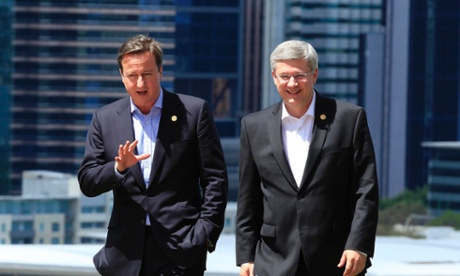
Instead of a “single-payer” scheme — of the kind that Obama himself supported before 2004 — a Democrat controlled congress and White House implemented a scheme designed in outline by the Heritage Foundation and first applied by Mitt Romney. The origins are important when we notice what the scheme does: maintains a transactional, privatised model of healthcare rather than a public one, and allows the insurance industry to continue extracting rents while paying out as little as possible.
Though it extends at least some coverage to those who may otherwise have had none, it also imposes high mandatory costs on low- to middle-income earners (up to 9.5% of their income). It does this without removing the risk of bankruptcy in the case of serious or debilitating illness, and without getting rid of high out of pocket expenses. That means that in a bad year, up to a third of a household’s income could disappear in health costs.
Many argue that the mainstream left favours these doomed schemes because they have been corrupted by the money politics of contemporary democracies, so that appeasing corporate donors has become more important than serving voters. To some extent, that’s no doubt true. But there is something more fundamental happening that goes to a suffocating Anglophone policy orthodoxy, and a lack of confidence in real progressive ideas.
Since the end of the Cold War (or even slightly before in Australia) centre-left parties have become essentially defensive, while the social democracies they helped build are eroded, sometimes by their own hand. In the view of the Blair-Clinton-Keating “third way”, the hangover from which still informs our centre-left parties, markets can only ever be negotiated with – never controlled. Economics is understood to be the authentic language of politics.
This orthodoxy is reinforced in the schools of government, economics and law that serve as political finishing schools for professional politicians, cut off from the social movements that once nourished their parties. It is repeated to them by the political advisers who attended the same schools. Even after the recession hollowed out the middle class, and increased the ranks of the poor, it has been assumed that the interests of the many can be made to coincide with the prosperity of the few. The left are terminally shy of picking fights.
The right have no such aversions. Whereas it’s difficult to say who centre-left parties see as their enemies outside the narrow field of electoral politics, the right target public sector workers, public broadcasters, academics and environmentalists for public attack. As the debate over economic issues has collapsed into consensus, it’s become easier for conservative parties sponsored by billionaires to mobilise their supporters on cultural issues, and to offer an inverse populism based on a hatred of elites. Fearing above everything the accusation of “class warfare”, the official left fails to ameliorate the condition of those going backwards, who will be hit hardest by looming environmental crisis.
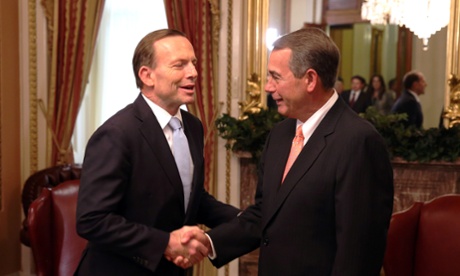
It’s evident that this unabashed antagonism has underpinned the right’s most significant victories, which consist in making their opponents take on their positions. The addiction of the centre-left to neoliberal economic orthodoxy is the least of this; the US Democrats and labour parties in the UK and Australia have taken on many of the right’s most frankly antidemocratic stances from sheer political timidity. In Australia, Liberal race-baiting has led Labor to mostly endorse the punitive treatment of asylum seekers, and they’re fully signed up to a continued war in the middle east. Labour in the UK are currently tracking right on immigration, having spent their last period in government refining methods for disciplining and surveilling those left behind by a deindustrialised economy. In the US, Obama has authorised extrajudicial drone executions, left Guantanamo open, and is leading the Anglosphere back into Iraq. The official left shows a contempt for the values of its natural supporters that the right would never dare to, or think to.
When Rudd and Obama were elected in quick succession, commentators rushed to draw a line under the neoliberal era that began with Reagan and Thatcher. They spoke too soon. On current form, if anyone is to do that, they will either will not be a part of mainstream left wing parties, or they will come from outside the advanced liberal democracies of the Anglosphere, where politics is less hostile to new and radical ideas.
Third parties like the Greens are attracting support in the UK and particularly in Australia, where Labor appears to have permanently conceded a quarter of its primary vote to the environmental party. But in those countries and in the US, the most inspiring initiatives may come from the citizenry itself. While ossified progressive parties actively reject the vitality of newer social movements concerned with the environment, inequality and new forms of identity politics. The desire for relevance may eventually persuade them that they need to pay closer attention to those demanding that capital be reined in, in the interests of the people and the planet.
Elsewhere, and particularly in Latin America, it’s evident that democratic socialism is still a possibility, and a field of experimentation. Their leaders’ commitment to basic economic justice is not only something that the Anglosphere’s left ought to take on, but which may be necessary for its survival. Those who say we have nothing to learn from still-developing economies have not paid enough attention to regressive developments closer to home. The millions who have been and soon will be immiserated by the machinery of liberal capitalism will have little time for the morality tales of neoliberalism. If existing centre left parties do not speak to their demands, who will?
Subscribe to:
Posts (Atom)

